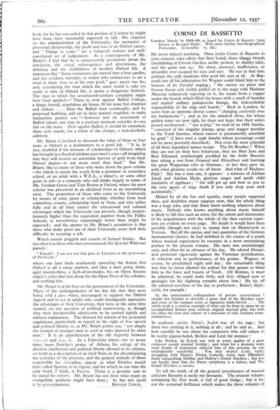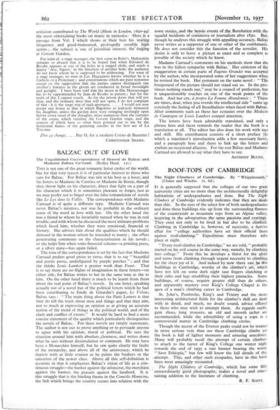CORNO DI BASSETTO
London Music in 1888-89, as heard by Como di Bassetto (later known as Bernard Shaiv). With some further Autobiographical Particulars. (Constable. 75. 6cl.)
HE never missed anything. Once invite Corn° di Basketto to your concert, once admit that fiery beard, those shaggy tweeds
(modulating at Covent Garden, under protest, to shabby, tails), and the game was up. No sham, pretence, inefficiency, or absurdity ever escaped his eyes and ears. He was at that time perhaps the only musician who used his eyes at all. At Bay- reuth not all his admiration for Wagner could blind him to the horrors of its Parsifal staging ; _ " the canvas set piece and Gower Street sofa visibly pulled on to the stage with Madame Materna seductively reposing on it, the steam from a copper under the boards which filled the house with a smell of laundry and melted axillary guttapercha linings, the indescribable impossibility of the wigs and beards." Back in London, he notes how an operetta chorus comes " charging cautiously over the battlements " ; and as for the admired divas, for whose golden tones we now sigh, let them not hope that their antics passed unobserved : " her acting," we read of an 1888 Amelia, " consisted of the singular plunge, gasp, and stagger peculiar to the Verdi heroine, whose reason is permanently unsettled by grief " (I have seen a 1936 Amelia whose postnringa could not be more precisely described). Not even the most splendid of all those legendary names escape. The De Reszkes ? When they are not on their best behaviour, they are Brer Jean and Brer Edouard, everlastingly prodded by the frolic Bassetto into taking a rest from Gounod and Meyerbeer and learning the great Wagnerian roles in German ; at last they gave in, with what glorious results we all know. And what of Madame Patti ? She was a rum one, it appears : a mixture of Adelina Jekyll and Adelina Hyde, glorious singer and spoilt child insatiable of applause ; " she will get up and bow to you in the very agony of stage death if you only drop your stick accidentally." .
Misled by all the fun and -sparkle; many people supposed
then, and doubtless many suppose now, that the whole thing was a huge joke, and that Shaw knew nothing whatever about music. Nobody who knows anything about music himself is likely to fall into such an error, for the extent and minuteness of his acquaintance with the whole of the then current reper- tory are evident on every page. No doubt it would have been possible (though not easy) to stump him on Monteverdi or Victoria. But all the operas, and vast quantities of the German instrumental classics, he had imbibed in the course of a youth whose musical experiences he recounts in a most entertaining preface to the present volume. His taste was astonishingly sure, and often far in advance of his day. He adored Mozart, and protested vigorously against the Victorian prettification, in criticism and in performance, of his genius. Wagner, of course, he proclaimed night and day ; the remarkable thing was that he never allowed his ardour for that genius to blind him to the force and beauty of Verdi. (Of Brahms, it must he admitted, he could make little, and feels obliged now to apologise for his slighting remarks about him.) He hit off
the admired novelties of the day to perfection ; Boito's Mefrs- tofele, for example :
In the unrestrained colloquialism of private conversation I should not hesitate to describe a great deal of the Brocken scene and some of the rampart scene as ingenious tiddy-fol-lol. . . . The whole work is a curious example of what can be done in opera by an accomplished literary man without original musical gifts, but with ten times the taste and culture of a musician of only ordinary extra- ordinariness.
In academic circles Parry's Judith was all the rage ; but there was nothing in it, nothing at all ; and he said so. And how sensible he was about the composers who still refuse to be neatly pigeon-holed, Berlioz and Liszt for instance :
Like Berlioz, he [Liszt] was rich in every quality of a great composer except musical fertility ; and when for a moment some stray breath of inspiration relieved him of this poverty, he was triumphantly successful. . . . You may respect Liszt, vainly struggling with Dante's Divine Comedy, more than Offenbach featly vanquishing Meilhac and Halevy's Grand Duchess ; but you can hardly deny that the Dante symphony is a failure, and Th..: Grand Duchess a success.
To tell the truth, of all the general practitioners of musical criticism Bassetto is easily my favourite. The present volume,
containing his Star work, is full of good things ; but it hal not the sustained brilliance which makes the three volumes of
criticism contributed to The World (Music in London, 1890-94) the most difertaininihOoks 'cii-music in existence.' • Here it' a
.
passage from Vol. I Which shows at their best his tearing eloquence and good-humoured, profoundly sensible high spirits ; . the _subject is one of 'perennial interest; The staging
at Covent 'Gaiden.
For want of a stage manager, the first scene in Boito's Mefistofele remains so absurd that it is to be, hoped that when Edouard de Reszke appears at one of the -holes in a ragged cloth, and sends a hearty Ave, Signor,' in the direction of another hole; the audience knowdo not kno whom he is supposed to be addressing. For want of a stage manager, no man in Les Huguenots knows whether he is a Catholic or 'a Protestant ; and conversations which are pure nonsense except on die supposition that the parties cannot distinguish one another's features in the gloom are conducted in broad moonlight and gaslight: have -been told that moon in Die Meistersinger has to be superintended by Jean de Reszke in person ; but for the truth of this I cannot vouch. As for the prison doors that will not shut, and the ordinary door' that will not open, I do not complain of that : it is the stage way of such apertures. . . . I would not now accept any house as that in which Rigoletto so jealously immured his daughter, unless the garden door were swinging invitingly open before every onset of the draughts, more numerous than the currents of the ocean, which ventilate the Covent Garden stage, and the courses of which have so often been pointed out to me by the horizontal flames of the guttering candles in the first act of La Traviata.
Plus fa change. . . . But 0, for a modern Como di Bassetto !
CHRISTOPHER SHAWE.















































 Previous page
Previous page